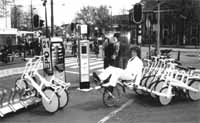City cycling
 in the 1960's, when the Netherlands' economy boomed and politicians promoted "a motor car for every labourer', bicycles were seen as the poor man's transport. But Luud Schimmelpenninck, then in his early twenties and a hippie, thought differently. Under his leadership, a group of rebellious student hippies launched Provo, a social movement, aimed at banning cars from the inner city of Amsterdam and introducing bicycles as the alternative.
in the 1960's, when the Netherlands' economy boomed and politicians promoted "a motor car for every labourer', bicycles were seen as the poor man's transport. But Luud Schimmelpenninck, then in his early twenties and a hippie, thought differently. Under his leadership, a group of rebellious student hippies launched Provo, a social movement, aimed at banning cars from the inner city of Amsterdam and introducing bicycles as the alternative.
When Schimmelpenninck was elected to the city council as a representative of the political wing of Provo a few years later, Schimmelpenninck officially proposed to introduce the "Witte Fietsen Plan' (white bikes)
Related Content
- Order of the National Green Tribunal regarding violation of environmental norms during the execution of the Netravathi Waterfront Promenade Project, Mangaluru, Karnataka, 05/03/2024
- E-bikes: charging toward compact cycling cities
- Global waste management outlook 2024
- Improving the quality of walking and cycling in cities
- The path less travelled: scaling up active mobility to capture economic and climate benefits
- Order of the National Green Tribunal regarding concretization of the river bed and flood plain of the Ayad river, Udaipur, Rajasthan, 05/09/2023
